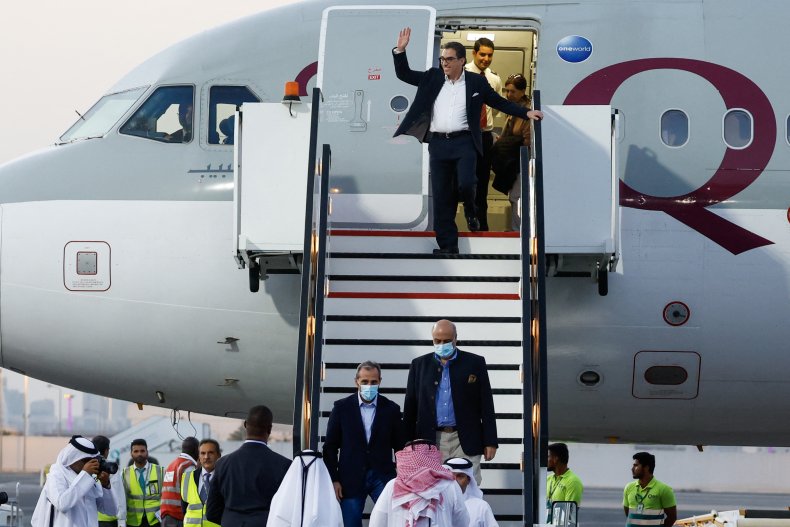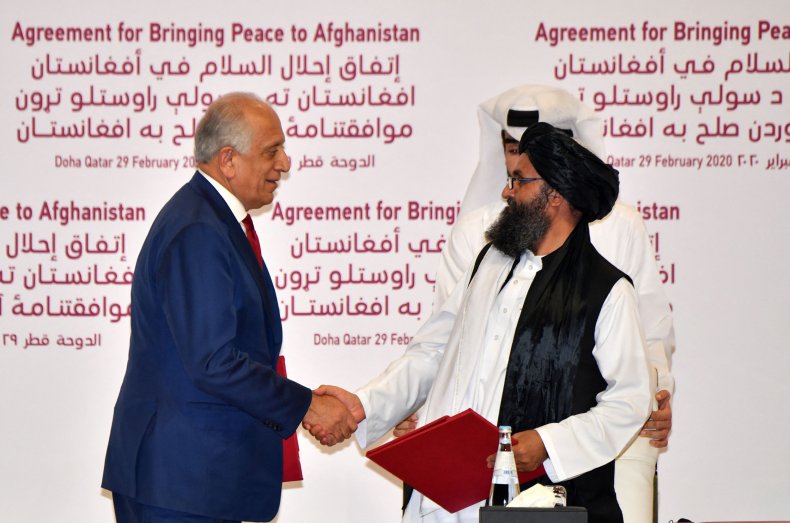As the Russia-Ukraine war grinds on with all the makings of a protracted conflict with no end in sight, a senior official from a small yet influential Middle Eastern nation with a growing history of unlikely diplomatic accomplishments told Newsweek that his country was open to mediating talks between Moscow and Kyiv.
“If asked to mediate in the Ukraine conflict, we would of course be ready to work towards facilitating dialogue and achieving peace in Europe,” Qatari Foreign Ministry State Minister Mohammed bin Abdulaziz Al Khulaifi told Newsweek. “This is desperately needed.”
Khulaifi recently played a key role in facilitating a rare agreement between the United States and Iran last month that saw a mutual exchange of prisoners and the release of around $6 billion in frozen Iranian assets. Now, Khulaifi said Qatar was hoping for an even more ambitious breakthrough in the Russia-Ukraine conflict, which is already in its 20th month.
“In fact, Qatar supports any and all constructive dialogue and negotiations that could lead to an end of the conflict,” Khulaifi said. “As has been our position from the beginning, we continue to call for an immediate cessation of military action in Ukraine.”
“Humanitarian corridors must remain open to allow aid into the country,” he added, “and Ukraine’s sovereignty and territorial integrity must be respected within its internationally recognized borders.”
At the same time, Khulaifi identified a number of other conflicts beyond Europe in which Qatar has played and continues to play a vital yet often overlooked role.
State of Qatar Ministry of Foreign Affairs
U.S. and Iran on the Field and at the Table
Qatar has a long history of playing an outsized role in global affairs. While many may readily recognize the tiny Arabian Peninsula-adjacent nation of roughly 2.8 million people straddling Saudi Arabia and the Persian Gulf as the host of last year’s FIFA World Cup, the first to be held in the Arab world, Qatar has managed to make even bigger strides in the realm of diplomacy.
Hosting the world’s largest sporting event may have offered an opportunity to bring the U.S. and Iran together in a dramatic matchup on the soccer pitch, but, behind the scenes, Qatar was helping to bring the two foes together in a capacity that Khulaifi said can be “best described as a facilitator, acting in the interest of building trust between the two parties,” as well as “identifying areas of common interest and working towards the peaceful resolution of tensions.”
“Qatar is of course a strategic partner of the United States—relations between our countries have never been stronger,” Khulaifi said. “We also maintain constructive ties with Iran in part due to our proximity to the country as neighbors, as well as our shared natural gas field.”
Khulaifi said the latest agreement “was the result of more than two years of diplomacy initiated at the request of both sides.” He expressed his pride in Qatar’s role in facilitating it as well as his hope that it “can pave the way for wider discussions on the nuclear issue and other outstanding disagreements.”
And while he noted that both Washington and Tehran have indicated that the exchange was separate from the long-stalled effort to revive a 2015 multilateral nuclear deal abandoned in 2018 by then-President Donald Trump, he pointed to Iranian President Ebrahim Raisi’s recent suggestion that the deal could “lead to other humanitarian actions” during a meeting with media executives attended by Newsweek on the sidelines of the United Nations General Assembly.
“These discussions are of course very complex, and building trust is a gradual process,” Khulaifi said. “The prisoner swap was a step forward in terms of demonstrating goodwill on both sides, but of course there are still lots of challenges to overcome.”
He added that “the recent deal demonstrates that dialogue between the U.S. and Iran is possible—disagreements can be resolved.”
“There is currently a lower risk of escalation, and a more positive atmosphere in relations between the two countries,” Khulaifi explained. “In terms of mediating in the future, Qatar has facilitated indirect negotiations between the U.S. and Iran for several years, so we stand ready to play an active role if asked.”

KARIM JAAFAR/AFP/Getty Images
Ending the United States’ Longest War
Qatar’s unique position in the Middle East is also complex.
Led by Emir Tamam bin Hamad Al Thani, the resource-rich monarchy is home to the largest U.S. military installation in the Middle East, the Al Udeid Air Base. Despite being a common U.S. security partner in the region, Saudi Arabia led a four-nation blockade alongside Bahrain, Egypt and the United Arab Emirates against Qatar in 2017, alleging the neighboring country harbored ties with terrorist networks tied to an array of actors, including Iran, the Muslim Brotherhood, Al-Qaeda and the Islamic State militant group (ISIS)—allegations consistently denied by Qatari officials.
The crisis ended in January 2021, as a wave of diplomacy still cresting today began to sweep the region. Even during the embargo, however, Qatar played a crucial role in bringing together rival parties, perhaps most notably the U.S. and the Taliban.
Beginning in July 2018, U.S. officials under the Trump administration began to openly acknowledge meetings with representatives of the Taliban in the Qatari capital of Doha. Negotiations continued for a year and a half until the historic Doha Agreement was signed in February 2020, which set the stage for the U.S. withdrawal from its 20-year war in Afghanistan that ultimately took place under President Joe Biden in August 2021.
Today, the Biden administration continues to work through Qatar to engage with the Taliban, which took over Afghanistan shortly after the collapse of the U.S.-backed government in the wake of the U.S. exit. As Khulaifi noted, “the work is not done.”
“Qatar’s focus since the caretaker government took over has been on trying to make sure the humanitarian needs of the Afghan people are met, while ensuring that human rights are upheld, including for women and girls,” Khulaifi said. “Currently, dialogue on Afghanistan is needed more than ever.”
“Disengaging with the Taliban is likely to do more harm than good, potentially creating a vacuum in the country and leading to an even larger humanitarian crisis,” he added. “This could have long-term consequences for the region.”
“The ultimate goal,” Khulaifi explained, is “a political solution in Afghanistan that guarantees security, stability, and human rights for the Afghan people.” And while he said that “Qatar is not currently considering recognition of the caretaker government,” as no other country in the world has, he explained that Qatar’s “focus is on coordinating global efforts to find a pragmatic route forward.”

GIUSEPPE CACACE/AFP/Getty Images
Lingering Tensions in the Holy Land
But perhaps the most challenging conflict of all for Qatar to navigate is one that predates its own existence as a sovereign state.
While Qatar was still more than two decades away from independence from United Kingdom rule when the first Arab-Israeli War broke out in 1948 over conflicting territorial claims between Israelis and Palestinians, Qatar, like most Arab, countries has never established diplomatic relations with Israel.
This policy has begun to soften over the course of the past 45 years, with Egypt first making peace with Israel in 1979, followed by Jordan in 1994 and, finally, the UAE, Bahrain, Sudan and Morocco as part of the U.S.-mediated Abraham Accords in late 2020 and early 2021. But Khulaifi said Doha was not ready to budge.
“Some countries may choose to normalize relations with Israel, but for Qatar, we do not see this as a realistic way to resolve the underlying conflict,” Khulaifi said. “Any solution must be agreed by the Palestinians and Israelis and based on the Arab Peace Initiative, which calls for a two-state solution with East Jerusalem as the capital of an independent Palestinian state.”
Both Israel and its close ally, the U.S., have pressed for further normalization agreements, especially with Saudi Arabia. But the Kingdom and other Arab powers, including Qatar, have continued to raise concerns about an ongoing uptick in violence in the Israeli-Palestinian conflict, as well as policies pursued by Israeli Prime Minister Benjamin Netanyahu and his ruling coalition that includes far-right elements.
While Qatar has also played a role in stabilizing occasional explosions of violence between Hamas and Israel, and just last week facilitated the reopening of Gaza Strip crossing points, Khulaifi said more was needed to be done to bring about a shift in Qatar’s position on the decades-long feud.
“Without a change in Israeli behavior and a clear peace process,” Khulaifi said, “normalization will not support a lasting peace between Palestine and Israel.”


